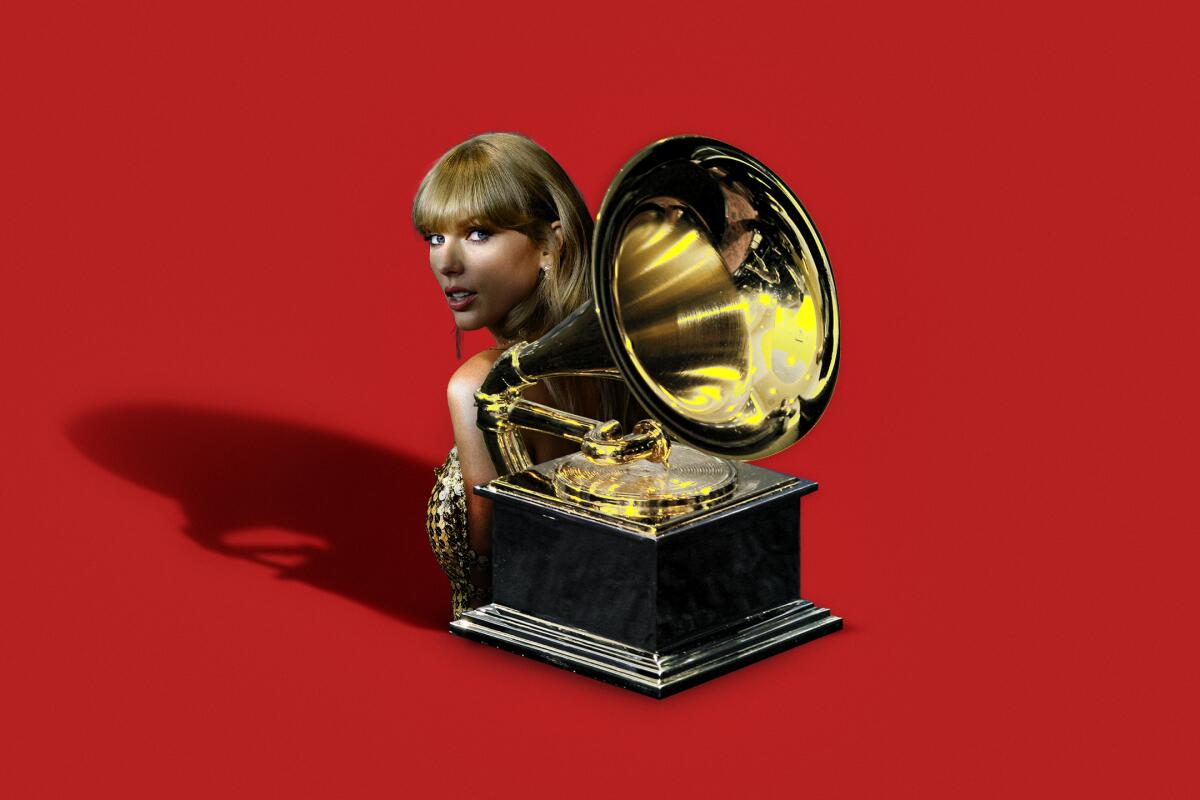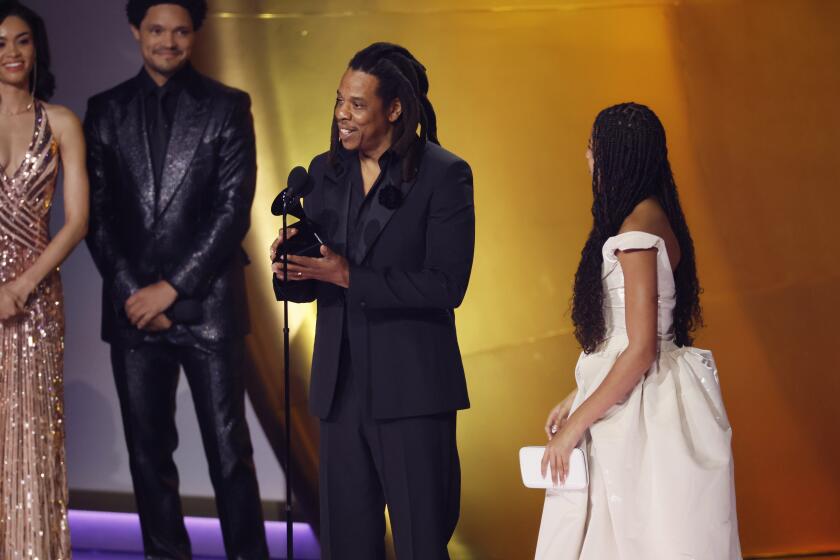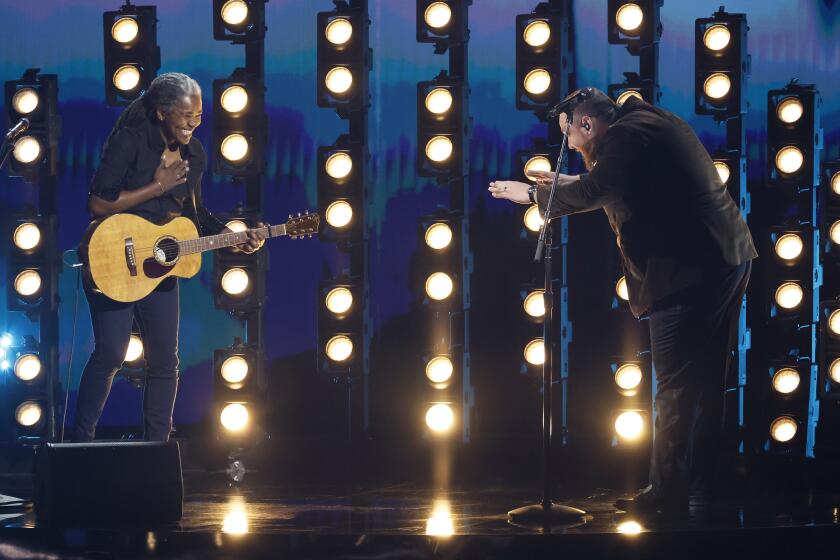This year, the Grammys were stuck between Taylor Swift and a hard place

- Share via
Maybe the real psyop was letting us think she might not win.
Accepting the pop vocal album prize for “Midnights” at Sunday’s 66th Grammy Awards, Taylor Swift thanked the Recording Academy, thanked her fans — then announced the upcoming release of an LP all but certain to take her to the 67th Grammy Awards.
“It’s called ‘The Tortured Poets Department,’” she said with a knowing little laugh, and you had to marvel at the confidence required to base a project launch on the assumption that her name would be inside that envelope.
Then again, did Swift actually need the stage time to pull off this reveal? At the end of her speech, she told the crowd she was headed backstage to post the new album’s cover — an acknowledgment of the direct line she has to her 280 million Instagram followers. (Whatever number the telecast eventually puts up in the ratings, it won’t come close to that.)
Had things not gone her way, perhaps she could’ve made her announcement next week at the Super Bowl, where she’s expected to watch her boyfriend, Travis Kelce — the football star involved with Swift in some sinister government plot, according to various right-wing conspiracy theorists — play with the Kansas City Chiefs.
Jay-Z’s comments about who gets overlooked by the Grammys interrupted regularly scheduled programming in a ceremony that badly needed it.
The point is that Swift is now bigger than the Grammys, which the Grammys know all too well. There was a sense of inevitability to Swift’s triumph Sunday, which climaxed when she won album of the year for the fourth time — more than any other artist in history, including Frank Sinatra, Paul Simon and Stevie Wonder, with whom she’d been tied at three wins apiece.
Given her utter domination of pop culture last year — due more to her career-spanning Eras tour and her blockbuster re-recordings of her earlier work than to “Midnights” — Swift arguably deserved to take the academy’s most prestigious award. The organization has been battling for years to prove that it’s in touch with modern music. To give album of the year to anyone but pop’s top superstar would be to risk sending the message that it’s learned nothing since the bad old days when Steely Dan beat Eminem or Herbie Hancock won over Kanye West.
Yet Swift’s win raises questions about what — and whom — this flagship prize is meant to recognize. What defines an album of the year? The Grammys have long sought to enshrine the sweet spot where creative ambition and critical acclaim overlap with commercial success and cultural impact. And for sure that sometimes means a juggernaut like George Michael’s “Faith” in 1989, Adele’s “21” in 2012 or indeed Swift’s pandemic-era “Folklore” in 2021.
“Midnights” is solid, but it’s not up to that standard, with only occasional flashes of Swift’s storytelling genius and little to make the listener think about the art of confessional songwriting in a fresh way. Its anointment at the Grammys feels like a reflexive response to Swift’s omnipresence, the effect of which was to crowd out more impressive work — namely SZA’s masterful “SOS,” a witty and audacious exploration of the singer’s fraught romantic life that forged new connections among R&B, hip-hop and pop punk and found a mass audience while illuminating the singer’s most intimate thoughts.
Obviously, the whole idea of an “album of the year” is a matter of taste, which is what separates the Grammys from data-driven shows such as the Billboard Music Awards or the iHeartRadio Music Awards. But the historical record demonstrates a pattern of neglect to which SZA’s defeat now belongs: In the Grammys’ 6½ decades, only three Black women — Natalie Cole in 1992, Whitney Houston in 1993 and Lauryn Hill in 1999 — have won its most prestigious award, a discouraging statistic clearly out of alignment with the reality of pop history.
Read our complete coverage of the 2024 Grammy Awards, including the night’s top winners, an unforgettable In Memoriam segment, Taylor Swift’s new album and more.
Jay-Z nodded to the problem Sunday while accepting the academy’s Dr. Dre Global Impact Award, invoking his wife Beyoncé’s repeated losses in the category — most recently for 2022’s astounding “Renaissance” — despite the fact that she’s won more Grammys than any other artist.
“Think about that: The most Grammys — never won album of the year,” he said. “That doesn’t work.”
Addressing the academy’s members, he said, “We want y’all to get it right — at least get it close to right,” meaning reward music of great importance in categories with the appropriate scope. His advice to artists who’ve been marginalized like this — recognized, as SZA was, with prizes in genre categories that suggest their innovations are of limited value — was to “keep showing up until they give you all those accolades you feel you deserve.”
And to some extent, Sunday’s ceremony bore out the effectiveness of that approach. There was Miley Cyrus, finally winning her first two Grammys (including “Flowers” being named record of the year) after ages in which academy voters seemed to hold her Disney Channel past against her. There was best new artist Victoria Monét, comparing herself to a plant breaking through the music industry’s soil at last thanks to the nourishment of hard work.
Most vividly, there was Tracy Chapman, back on the Grammys stage after years out of the spotlight to sing “Fast Car,” her gentle yet resolute anthem of self-determination, alongside Luke Combs, the country star who had a huge hit last year with a cover of the decades-old song. As Chapman sang and played guitar, she looked satisfied, serene, almost beatific. But then, she wasn’t at the Grammys to compete.
More to Read
The biggest entertainment stories
Get our big stories about Hollywood, film, television, music, arts, culture and more right in your inbox as soon as they publish.
You may occasionally receive promotional content from the Los Angeles Times.













